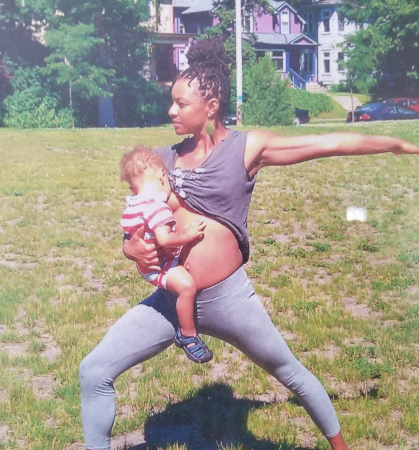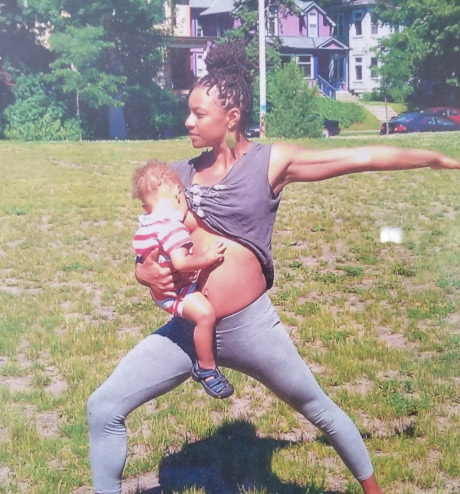Breastfeeding is often portrayed as one of the most natural things a woman can do—and it’s not always easy right away. Learning to breastfeed your baby takes practice and patience. It's normal to have questions, whether you’re a first-time or veteran mom.
From baby’s first latch to using a breast pump, every Ob/Gyn provider at UNM Hospital—including certified nurse midwives like me, our lactation experts and our nurses—are prepared to guide and encourage you in breastfeeding.
UNM Hospital was the first hospital in Albuquerque to earn a Baby-Friendly designation. That means we prioritize giving you the tools and support you need for successful breastfeeding, even after you leave the hospital via our newborn clinic.
The American Academy of Pediatrics recommends that babies be exclusively breastfed for the first six months with continued breastfeeding while introducing new foods for one year. The Centers for Disease Control and Prevention (CDC) reports that 84% of babies born in the U.S. start breastfeeding, but only 58% were still breastfeeding at six months. In New Mexico, those numbers are slightly lower, at 83% and 57%, respectively.

"Breastfeeding rates at UNM Hospital are above average—60% of all women who deliver at UNM are exclusively breastfeeding at discharge. For midwifery patients in 2019, 86% were breastfeeding at 48 hours after delivery."
Noelle Borders, Chief, Midwifery Division
Breastfeeding has numerous benefits for mom and baby. Breastfed babies have stronger immune systems and tend to get fewer colds, respiratory illnesses, and ear infections. They also have lower risks of asthma, obesity, allergies, diabetes, and sudden infant death syndrome (SIDS). Breastfeeding also can lower a woman’s risk of depression, high blood pressure, type 2 diabetes, and ovarian and breast cancers, as well as help them lose baby weight faster.
While we know breastfeeding often is best for mom and baby, it's not the only thing that affects a baby’s health. Mom’s physical and emotional well-being also plays a role, and if breastfeeding negatively impacts that, it’s no good for baby either.
The breastfeeding journey starts before baby is even born. I start talking to expecting moms about breastfeeding during prenatal visits. We have booklets you can take home to read, and at your following appointments, we can discuss and answer any questions you might have.
Our goal is to give you the information you need to make the best decision for yourself and your baby, and then support you in your decision. Let's start with the basics – answering five of the most common questions breastfeeding moms ask in those first few crucial weeks.
1. How do I get my baby to latch properly?
Learning to latch properly is one of the biggest challenges new moms worry about. Many babies instinctively know how to grasp the breast in their mouth, while others (especially preemies or babies who have to stay in the NICU) need extra time to figure it out.
Positioning yourself comfortably is a good first step. Many new moms use pillows in their lap to support their arm as they hold the baby to their chest. Baby will root around the breast until they find the nipple. Then they open their mouth wide and take in a large mouthful of breast. You should feel a gentle tugging (but not pain) as the baby's mouth creates suction around your areola (the colored area around the nipple).
Just as most children won’t jump on a bike and ride it right away, some moms and babies need a little more training. Get lots of skin-to-skin contact with your new little one to learn their personality and hunger cues. Follow your baby’s lead and know that most babies figure it out with time and patience.
2. Is my baby getting enough breastmilk?
This is a very common concern among breastfeeding mothers, leading many women to stop trying to breastfeed. Be assured: Almost all moms produce enough breastmilk to feed their little ones.
You’ll start by producing a few drops to a couple teaspoons of protein-rich colostrum, the first thick, golden-colored milk your body produces. The colostrum contains all your baby needs for those first few days. Over the next couple days, your milk will turn a cloudy white. as water begins to be included.
Newborns will eat about one teaspoon of milk in the first 24 hours and then double their milk intake every day after until they start eating mostly solid foods.
Watch for these signs to reassure you that the baby is getting enough breastmilk:
- Wet and dirty diapers: The first few days you can expect to change your baby’s diaper a couple times, but as they begin to eat more, you can expect about six wet and three dirty diapers each day.
- Weight: Most babies will lose a little weight in the first few days. This is normal and not necessarily an indication they are not getting enough to eat. After the first three to five days, they should begin to gain up to an ounce a day.
- Soft breasts: Your breasts should feel soft after feeding. This means they are less full and that baby has fed.
- Happy baby: You baby should seem content and relaxed after feeding. Like us, they may also feel sleepy when their belly is full.
It's rare that a woman can’t make enough milk. In those situations, your Ob/Gyn provider or baby's pediatrician can help you find healthy alternatives.
3. Is breastfeeding painful?
Breastfeeding feels a little different to every woman, but it should not be painful. I describe it as a little tugging on the nipple. But whatever sensation you experience, it shouldn’t be unbearable. If breastfeeding is painful, or even uncomfortable, talk to your lactation expert, midwife or Ob/Gyn. It could be that your baby is not latching correctly or you might have a blocked milk duct.
4. How often should I breastfeed?
Every baby is different, but most babies will nurse eight to 12 times a day for the first few months—about every two to four hours. As they get older, and especially as they start to eat solid foods, how often they eat will vary.
Follow your baby's cue. Let your baby nurse for as long as they are actively sucking and swallowing. Some feeding sessions may be longer than others. Afterward, your baby should seem happy, relaxed, and drowsy.
5. What if I need help breastfeeding?
As with any new activity, many women need a little help getting the hang of breastfeeding. This is completely normal and does not in any way reflect on your abilities as a mom.
While you’re doing the first feedings at the hospital, you’ll have access to our board-certified lactation consultants. All of the nurses who'll care for you after delivery are trained in breastfeeding support. Once you leave the hospital, you can always call or visit our lactation clinic to get help with anything breastfeeding related, such as:
- Comfortably positioning the baby
- Helping baby get a good latch
- Nursing a premature, sick, or special-needs infant
- Using a breast pump
- Introducing your baby to solid foods
- Weaning your baby

Breastfeeding moms often have questions or concerns. This is normal. Please feel free to ask for help from a lactation expert, midwife, or Ob/Gyn.
A day or two after you leave the hospital, you can visit our newborn clinic. We'll check your baby’s overall health and answer your questions, including about breastfeeding. This clinic is a wonderful resource that I encourage all new moms to take advantage of.
If you’re considering breastfeeding, there are also classes you can take before the baby arrives. Learn more.
Just as every baby’s birth story is different, so too is every woman’s breastfeeding story. We encourage you not to compare your journey to others'—make your own story! As you and your baby learn to breastfeed, be patient. Ask for help if something doesn’t feel right or isn’t working. We’re always happy to give you guidance and insights.
To schedule an appointment with a breastfeeding expert, call 505-272-2245.
To find out whether you or a loved one might benefit from Ob/Gyn care, call 505-272-2245.

